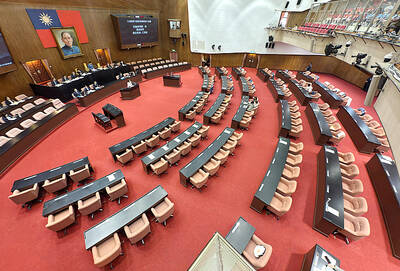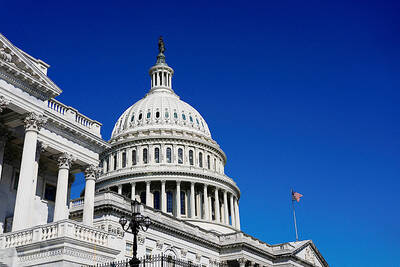The European Central Bank (ECB) is trying to convince people in the eurozone that taking a tough stand on inflation will get them through lean economic times, arguing that long-term gains warrant short-term pain.
“There is a particular need to speak to citizens on inflation and monetary policy right now,” Natixis economist Sylvain Broyer said after ECB President Jean-Claude Trichet laid out the bank’s stance in an interview with four major eurozone newspapers.
Public opinion is emerging as key ground to be won since the bank raised its main lending rate despite signs that economic activity was slowing sharply in the 15-country eurozone.
Politicians have urged the ECB to ease policies that determine credit conditions for about 320 million people, though they know its main goal is to keep inflation, which hit a record 4 percent last month, in check.
The ECB argues that sustainable growth is best served by making sure people know the bank will target inflation of just below 2 percent, even if that means letting the economy contract for some months.
“So far it’s been easy,” said Bank of America economist Gilles Moec, pointing to low interest rates a few years ago when many questioned whether inflation had finally been beaten.
“I don’t think any politician in France or Italy dreamed of seeing interest rates at 2 percent just three years after monetary union” in 1999, he said, referring to conditions that also fueled housing booms in countries like Spain and Ireland. “Now we’re getting into the territory where it hurts, where its painful.”
Like economies around the world, the eurozone has been hit by high oil and food prices and tighter credit sparked by the global financial crisis that have eaten away at household budgets and curbed spending on many non-essential items.
Eurozone exporters are also hampered by the euro’s rise to record highs above US$1.60 that make their products more expensive abroad, and weaker economic conditions in key trading regions that have reduced demand further.
The eurozone’s trade balance fell into deficit in May, while industrial output slumped and growth forecasts were scaled back.
That has forced Trichet to make his case to the public, which he often does by referring to “the poorest and the most vulnerable that can do the least to protect themselves from rising inflation.”
He argues for example that rising wages following the oil shocks of the 1970s created mass unemployment in Europe, compared with 15.7 million jobs generated since the single currency was born nine years ago.
“Speaking to several newspapers is a good way to communicate to the wider public,” Commerbank economist Michael Schubert said.
The central bank’s policy, he said: “Completely depends on inflation expectations,” or widespread belief that prices will rise sharply or not in the future.
That can influence decisions from whether or not to buy a home appliance to business investments involving tens of millions of euros or long-term interest rates that require governments to pay massive sums to finance their budgets.
Moec said he thought Trichet’s remarks were addressed to European leaders who seek to influence the ECB, the independence of which was laid down in the Maastricht Treaty.
“Let’s not get into a debate on the mandate,” was the message Moec heard, “because we already have systems in place” to ensure politicians’ views were heard.
While ECB independence is firmly established, efforts to gain influence “could have some consequences if it was seen elsewhere, especially in the US or the UK, that there is some internal fragility in the system,” the Bank of America economist said.
Broyer also saw tension building between EU leaders like French President Nicolas Sarkozy and the ECB, saying: “I think it will enter a more strained phase.”
The euro’s success would “radically transform the European economy” and force governments to reform obsolete industrial methods, with the past nine years just “the beginning of the phenomenon,” he said.
“What does not work today is the European political model,” Broyer said after Ireland rejected the EU’s draft Lisbon Treaty designed to ease future enlargement.

The Chien Feng IV (勁蜂, Mighty Hornet) loitering munition is on track to enter flight tests next month in connection with potential adoption by Taiwanese and US armed forces, a government source said yesterday. The kamikaze drone, which boasts a range of 1,000km, debuted at the Taipei Aerospace and Defense Technology Exhibition in September, the official said on condition of anonymity. The Chungshan Institute of Science and Technology and US-based Kratos Defense jointly developed the platform by leveraging the engine and airframe of the latter’s MQM-178 Firejet target drone, they said. The uncrewed aerial vehicle is designed to utilize an artificial intelligence computer

The Chinese Nationalist Party (KMT) caucus yesterday decided to shelve proposed legislation that would give elected officials full control over their stipends, saying it would wait for a consensus to be reached before acting. KMT Legislator Chen Yu-jen (陳玉珍) last week proposed amendments to the Organic Act of the Legislative Yuan (立法院組織法) and the Regulations on Allowances for Elected Representatives and Subsidies for Village Chiefs (地方民意代表費用支給及村里長事務補助費補助條例), which would give legislators and councilors the freedom to use their allowances without providing invoices for reimbursement. The proposal immediately drew criticism, amid reports that several legislators face possible charges of embezzling fees intended to pay

REQUIREMENTS: The US defense secretary must submit a Taiwan security assistance road map and an appraisal of Washington’s ability to respond to Indo-Pacific conflict The US Congress has released a new draft of the National Defense Authorization Act (NDAA), which includes up to US$1 billion in funding for Taiwan-related security cooperation next year. The version published on Sunday by US House of Representatives Speaker Mike Johnson removed earlier language that would have invited Taiwan to participate in the US-led Rim of the Pacific Exercise (RIMPAC). A statement on Johnson’s Web page said the NDAA “enhances U.S. defense initiatives in the Indo-Pacific to bolster Taiwan’s defense and support Indo-Pacific allies.” The bill would require the US secretary of defense to “enable fielding of uncrewed and anti-uncrewed systems capabilities”

Renewed border fighting between Thailand and Cambodia showed no signs of abating yesterday, leaving hundreds of thousands of displaced people in both countries living in strained conditions as more flooded into temporary shelters. Reporters on the Thai side of the border heard sounds of outgoing, indirect fire yesterday. About 400,000 people have been evacuated from affected areas in Thailand and about 700 schools closed while fighting was ongoing in four border provinces, said Thai Rear Admiral Surasant Kongsiri, a spokesman for the military. Cambodia evacuated more than 127,000 villagers and closed hundreds of schools, the Thai Ministry of Defense said. Thailand’s military announced that